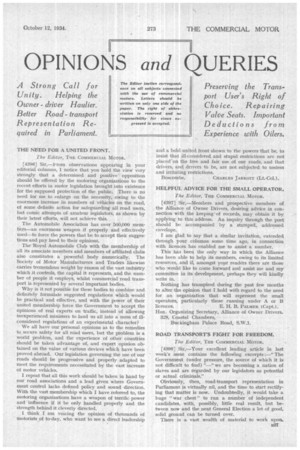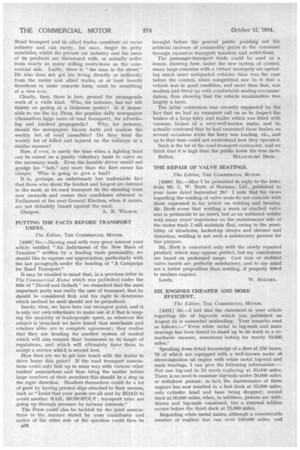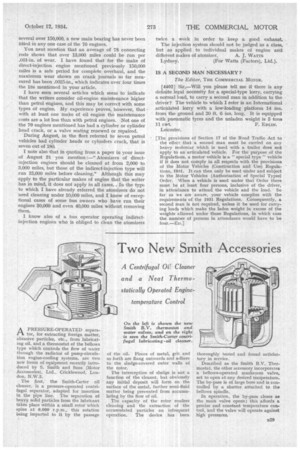OPINIONS
Page 45

Page 46

Page 47

If you've noticed an error in this article please click here to report it so we can fix it.
and QUERIES
THE NEED FOR A UNITED FRONT.
The Editor, THE COMMERCIAL Moron..
[4396] Sir,—From observations appearing in your editorial columns, I notice that you hold the view very strongly that a determined and positive opposition should be offered by the motoring organizations to the recent efforts in motor legislation brought into existence for the supposed protection of the public. There is no need for me to enlarge on the necessity, owing to the enormous increase in numbers of vehicles on the road, of some definite action for safeguarding all road users, but comic attempts of amateur legislators, as shown by their latest efforts, will not achieve this.
The Automobile Association has over 500,000 members—a.n enormous weapon if properly and effectively used—to force the powers that be to accept their suggestions and pay heed to their opinions.
The Royal Automobile Club with the membership of all its associate members and members of affiliated clubs also constitutes a powerful body numerically. The Society of Motor Manufacturers and Traders likewise ' carries tremendous weight by reason of the vast industry which it controls, the capital it represents, and the number of people it employs, whilst commercial road transport is represented by several important bodies.
Why is it not possible for these bodies to combine and definitely formulate suggested regulations which would be practical and effective, and with the power of their united membership force the Government to accept the opinions of real experts on traffic, instead of allowing inexperienced ministers to land us all into a mess of illconsidered regulations of an experimental character?
We all have our personal opinions as to the remedies to secure safety for all road users, but the problem is a world problem, and the experience of other countries should be taken advantage of, and expert opinion obtained on the value of various devices which have been proved abroad. Our legislation governing the use of our roads should be progressive and properly adapted to meet the requirements necessitated by the vast increase of motor vehicles.
I repeat that all this work should be taken in hand by our road associations and a lead given where Government control lacks defined policy and sound direction. With the vast membership which I have referred to, the motoring organizations have a weapon of terrific power and influence if it be only handled properly and the strength behind it cleverly directed.
I think I am voicing the opinion of thousands of motorists of to-day, who want to see a direct leadership and a bold united front shown to the powers that be, to insist that ill-considered and stupid restrictions are not placed on the free and fair use of our roads, and that drivers, and drivers to be, are not subjected to useless and irritating restrictions.
Boscombe. CHARLES JARROTT
HELPFUL ADVICE FOR THE SMALL OPERATOR. The Editor, THE COMMERCIAL MOTOR.
[4397] Sir,-1VIembers and prospective members of the Alliance of Owner Drivers, desiring advice in connection with the keeping of records, may obtain it by applying to this address. An inquiry through the post should be accompanied by a stamped, addressed envelope.
I am glad to say that a similar invitation, extended through your columns some time ago, in connection with licences has enabled me to assist a number.
This has been the only way in which the Alliance has been able to help its members, owing to its limited resources, and if, amongst your readers there are those who would like to come forward and assist me and my committee in its development, perhaps they will kindly write in.
Nothing has transpired during the past few months to alter the opinion that I hold with regard to the need for an organization that will represent the small operators, particularly those running under A or B licences. E. H. B. PALMER (Capt.). Hon, Organizing Secretary, Alliance of Owner Drivers. 328, Coastal Chambers, Buckingham Palace Road, S.W.1.
ROAD TRANSPORT'S FIGHT FOR FREEDOM.
The Editor, THE COMMERCIAL MOTOR.
[4398] Sir,—Your excellent leading article in last week's issue contains the following excerpts :—" The Government (under pressure, the source of which it is not difficult to find) "—" we are becoming a nation of slaves and are regarded by our legislators as potential or actual criminals."
Obviously, then, road-transport representation in Parliament is virtually nil, and the time to start rectifying that matter is now. Undoubtedly, it would take a huge "war chest" to run a number of independent candidates, with, possibly, little real result, but between now and the next General Election a lot of good, solid ground can be turned over.
There is a vast wealth of material to work upon. 1327
Road transport and its allied trades constitute no mean industry and can surely, for once, forget its petty squabbles, whilst the private car industry and the users of its products are threatened with, or actually suffer from nearly as many stifling restrictions as the commercial side. Lastly, there is " the man in the street." He who does not get his living directly or indirectly from the motor and allied trades, or at least benefit therefrom in some concrete form, must be something of a rare avis.
Clearly, then, there is here ground for propaganda work of a virile kind. Who, for instance, has not felt thirsty on gazing at a Guinness poster? Is it impos sible to use the lay Press, the popular daily newspapers (themselves large users of road transport), for advertis ing and kindred propaganda? Why, for instance, should the newspapers blazon forth and analyse the weekly list of road casualties? Do they treat the weekly list of killed and injured on the railways in a similar manner?
Now, if ever, is surely the time when a fighting fund can be raised on a purely voluntary basis to carry on the necessary work. Even the humble ;driver would not grudge his "bob," any more than the fleet owner his cheque. Who is going to give a lead?
It is, perhaps, an unfortunate but undeniable fact that those who shout the loudest and longest are listened to the most, so let road transport do the shouting from now onwards and ensure that candidates returned to Parliament at the next General Election, when it comes, are not definitely biased against the road.
Glasgow. A. R. WILSON.
PUTTING THE FACTS BEFORE TRANSPORT USERS.
The Editor, THE COMMERCIAL MOTOR.
[4399] Sir,—Having read with very great interest your article entitled "An Indictment of the New Basis of Taxation" written by a leading trade personality, we should like to express our appreciation, particularly with the last paragraph under the heading of "A Campaign for Road Transport."
It may be recalled to mind that, in a previous letter to The Uoirtinereial Motor which was published under the title of "David and Goliath" we remarked that the most important party was really the user of transport, that he should be considered first, and his right to determine which method he used should not be prejudiced.
Surely, then, we have here our strongest point, and it is only our own reluctance to make use of it that is keeping the majority of tradespeople quiet, as wherever the subject is broached we have found that merchants and retailers alike are in complete agreement ; they realize that they are heading for another system of control which will also enmesh their businesses in its tangle of regulations, and which will ultimately force them to accept a service which is second best.
How then are we to get into touch with the trader to drive home this point? If the road transport associations could only link up in some way with various other traders' associations and thus bring the matter before large numbers of their members this should be a step in the right direction. Hauliers themselves could do a lot of good by having printed slips attached to their memos, Such as "Insist that your goods are all sent by ROAD to avoid another RAIL MONOPOLY; transport rates are going up through pressure by railway interests."
The Press could also be tackled by the joint associations in the manner stated by your contributor and notice of the other side of the question could then he 3528 brought before the general public pointing out the artificial increase of commodity prices to the consumer through excessive transport taxation and restrictions.
The passenger-transport trade could be used as a lesson, showing how, under the new system of .control, many large concerns with a virtual monopoly are operatingmuch more antiquated vehicles than was thecase before the control, when competition saw to it that a vehicle was in good condition, and more than that, was modern and fitted up with comfortable seating accommodation, thus showing that the vehicle examination was largely a farce.
The latter contention was recently supported by the fact that we had an examiner call on us to inspect the brakes of a large lorry and trailer which was fitted with vacuum brakes of a very-well-known make, and he actually confessed that he had examined these brakes on several occasions while the lorry was loading, etc., and up to that time could not understand how they operated.
Such is the lot of the road-transport contractor, and we think that it is high time the public knew the true facts.
Belton. MILLICHAMP BROS.
THE REPAIR OF VALVE SEATINGS.
The Editor, THE COMMERCIAL MOTOR.
[4400] Sir,—May I be permitted to reply to the letter from Mr. C. W. Brett, of Barimar, Ltd., published in your issue dated September 28? I note that his views regarding the welding of valve seats do not coincide with those expressed in my article on welding and brazing. Mr. Brett avers that welding a worn or cracked valve seat is preferable to an insert, but as an unbiased welder with many years' experience on the maintenance side of the motor trade I still maintain that, owing to the possibility of blowholes, locked-up strains and stresses and distortion, welding is not such a satisfactory process for this purpose.
Mr. Brett is concerned only with the newly repaired product, which may appear perfect, but my conclusions are based on prolonged usage. Cast iron or stellited valve inserts are perfectly satisfactory, and to my mind are a better proposition. than welding, if properly fitted to modern engines.
Leeds. W. HOLMES.
OIL ENGINES CHEAPER AND MORE EFFICIENT.
The Editor, THE COMMERCIAL MOTOR.
[4401] Sir,—I feel that the statement in your article regarding life of big-ends which you published on August 24 is somewhat misleading. Your remarks read as follows :--" Even white metal in big-ends and main bearings has been found to stand up to its work in a remarkable manner, sometimes lasting for nearly 50,000. miles."
Speaking from detail knowledge of a fleet of 250 buses, 70 of which are equipped with a well-known make of direct-injection oil engine with white metal big-end and main bearings, I can give the following information:— Not one big-end in 50 needs replacing at 50,000 miles. There is no need to examine big-ends under 50,000 miles, or withdraw pistons ; in fact, the maintenance of these engines has now resulted in a first dock at 25,000 miles, only cylinder head and base being dropped ; second dock at 50,000 miles, when, in -addition, pistons are withdrawn and big-ends examined, but a renewal .seldom occurs before the third dock at 75,000 miles.
Regarding white metal mains, although a considerable number of engines has run over 100,000 miles, and several over 150,000, a new main bearing has never been fitted in any one case of the 70 engines.
You next mention that an average of 78 connecting rods shows that over 13,000 miles could be run per .001-in, of wear. I have found that for the make of direct-injection engine mentioned previously 150,000 miles is a safe period for complete overhaul, and the maximum wear shown on crank journals so tar measured has been .0025-in., which indicates over four times the life mentioned in your article.
I have seen several articles which seem to indicate that the writers consider oil-engine maintenance higher than petrol engines, and this may be correct with some types of engine. My experience proves, however, that with at least one make of oil engine the maintenance costs are a lot less than with petrol engines. Not one of the 70 engines mentioned has had a cylinder or cylinder head crack, or a valve seating renewed or repaired. During August, in the fleet referred to seven petrol vehicles had cylinder heads or cylinders crack, that is seven out of 180.
I note also that in quoting from a paper in your issue of August 31 you mention :—" Atomizers of directinjection engines should be cleaned at from 2,000 • to 3,000 miles, but those of the indirect-injection type will run 15,000 miles before cleaning." Although this may apply to the particular makes of engine that the writer has in mind, it does not apply in all cases.. In the type to which I have already referred the atomizers do not need cleaning under 10,000 miles, and I know of exceptional cases of some bus owners who have run their engines 30,000 and even 40,000 miles without removing them.
I know also of a bus operator operating indirectinjection engines who is obliged to clean the atomizers twice a week in order to keep a good exhaust. The injection system should not be judged as a class, but as applied to individual makes of engine and different makes of atomizer. A. J. WATTS Lydney. (For Watts (Factors), Ltd.).
IS A SECOND MAN NECESSARY?
The Editor, THE COMMERCIAL MOTOR.
[4402] Sir,—Will you please tell me if there is any definite legal necessity for a special-type lorry, carrying a normal load, to Garry a second man in addition to the driver? The vehicle to which I refer is an International articulated lorry with a low-loading platform 14 ins. from the ground and 20 ft. 6 ins. long. It is equipped with pneumatic tyres and the unladen weight is 5 tons 11 cwt. F. EDLIN. Leicester.
[The provisions of Section 17 of the Road Traffic Act to the effect that a second man must be carried on any heavy motorcar which is used with a trailer does not apply to an articulated vehicle. For the purpose of the Regulations, a motor vehicle is a "special type" vehicle if it does not comply in all respects with the provisions of the Motor Vehicles (Construction and Use) Regulations, 1931. It can then only be used under and subject to the Motor Vehicles (Authorisation of Special Types) Order. When a vehicle is used under that Order there must be at least four persons, inclusive of the driver, in attendance -to attend the vehicle and the load. So far as we are aware, your vehicle complies with the requirements of the 1931 Regulations. Consequently, a second man is not required, unless it be used for carrying loads which make the laden weight in excess of the weights allowed under those Regulations, in which case the number of persons in attendance would have to be four.—En.]




































































































